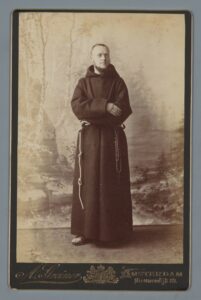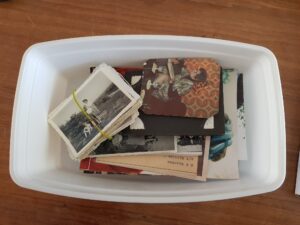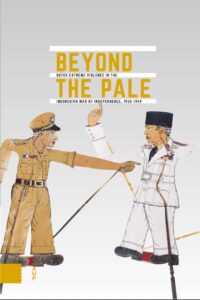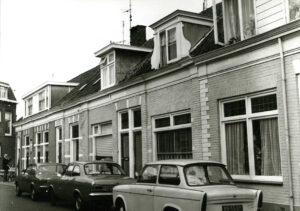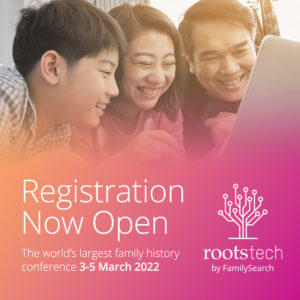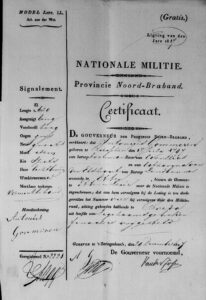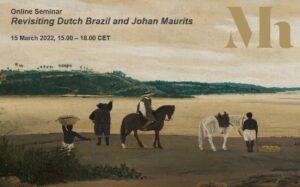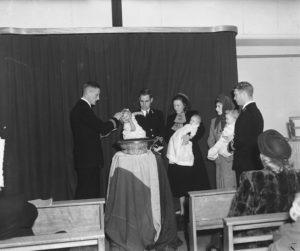A monnik is a monk. Monniken are mostly found in the Roman-Catholic parts of the Netherlands like Noord-Brabant or Limburg. Before the Reformation, they were found all over the country. In the Middle Ages, many cities had monasteries where monks lived. In some towns, the monasteries disappeared but the name can still be found in street names or field names. Nowadays, few men become monks, even among Roman-Catholics. … [Read more...]
What file format should I use to preserve family photos?
PNG. GIF. TIFF. PDF. JPG. When it comes to choosing a file format for images, the possibilities are endless. Like many genealogists, I am scanning my family photos. I have several reasons for doing so: I want to create a backup in case there is a fire or flood and I lose the originals I want to use the scans in my family tree, on my blog, and other publications. I want to share the scans with other family members. We may only have one copy of the original, but we can easily create … [Read more...]
Quick tip – Book about the Dutch violence in Indonesia, 1945-1949
A new study sheds more light on the extreme violence by the Dutch army in the Indonesian war of independence after World War II. The book is available as open access. Beyond the Pale: Dutch Extreme Violence in the Indonesian War of Independence, 1945-1949 … [Read more...]
Dutch Genealogy News for February 2022
Here is an overview of the new sources, websites, and news from archives announced last month. Sources Several archives are making progress with the national project to digitize notarial records: Scans of notarial records of Maastricht and Roermond (1896-1905) are now available at Archieven.nl. Scans of notarial archives of Appingedam (1812-1922) are available at Groninger Archieven. Scans of notarial records of Jutphaas (1694-1842) are now available at Utrechts Archief. … [Read more...]
Dutch talks at RootsTech (3-5 March 2022)
RootsTech, the largest genealogy conference in the world, is virtual again this year. From 3-5 March, speakers from all over the world will share their expertise and inspiring stories. Free registration is required. There are several presentations that focus on genealogy in the Netherlands: Researching Records in the Netherlands Discovering Online Dutch archives Searching for Family in Amsterdam … [Read more...]
Ask Yvette – Is an online tree a source?
In the Facebook group Goeree-Overflakkee History, Genealogy, and DNA, Rene Luijkenaar asked me a question: What can be counted as a source? Can an online tree be counted as a source? I thought I would answer in a blog post, since I know other people have the same questions. Sources are containers of information. There are three types of sources: original, derivative, and authored. I will discuss each type, with examples from the Netherlands. Original source An original source is the first … [Read more...]
Dutch term – Vrijstelling
A vrijstelling is an exemption. You may come across the term in military enlistment registers or marriage supplements, if a person was vrijgesteld [exempted] from military service. Example: Antonie Gommeren's military exemption When Antonie Gommeren married Adriana Timmermans in Etten-Leur on 27 January 1828, he had to prove he had fulfilled his military duties. He submitted a certificate of National Militia that included the text "uit hoofde van ligchaamsgebreken finaal vrijgesteld" [received … [Read more...]
Quick tip – Online seminar Revisiting Dutch Brazil and Johan Maurits
On 15 March 2022, the Mauritshuis will organize an online seminar about Dutch Brazil and Johan Maurits. Attendance is free, registration is required. See the Mauritshuis website for details about the program and registration. … [Read more...]
Dutch terms for different prisons
Before 1811, locking people up was typically not used as a punishment. People could be confined while awaiting trial, or could be committed to a tuchthuis (house of discipline) where they had to do hard labor. In 1811, the French prison model was introduced, where people would be locked up in a gevangenis [prison]. The system was overhauled in 1821 and again in 1886. Here is an overview of the different terms and meanings. For more information about researching prisoners, see the articles … [Read more...]
Quick tip – Which baptisms did your ancestor witness?
Baptismal witnesses were often close relatives or friends of the parents of the child. Knowing their associates and relatives can help you prove their identity and parentage. You should look at baptismal witnesses from both sides: Check the people your ancestors chose as baptismal witnesses for their children Check for whom your ancestors acted as baptismal witnesses. Most researchers do the first, since the information is there when they look up all the children. Fewer researchers … [Read more...]
